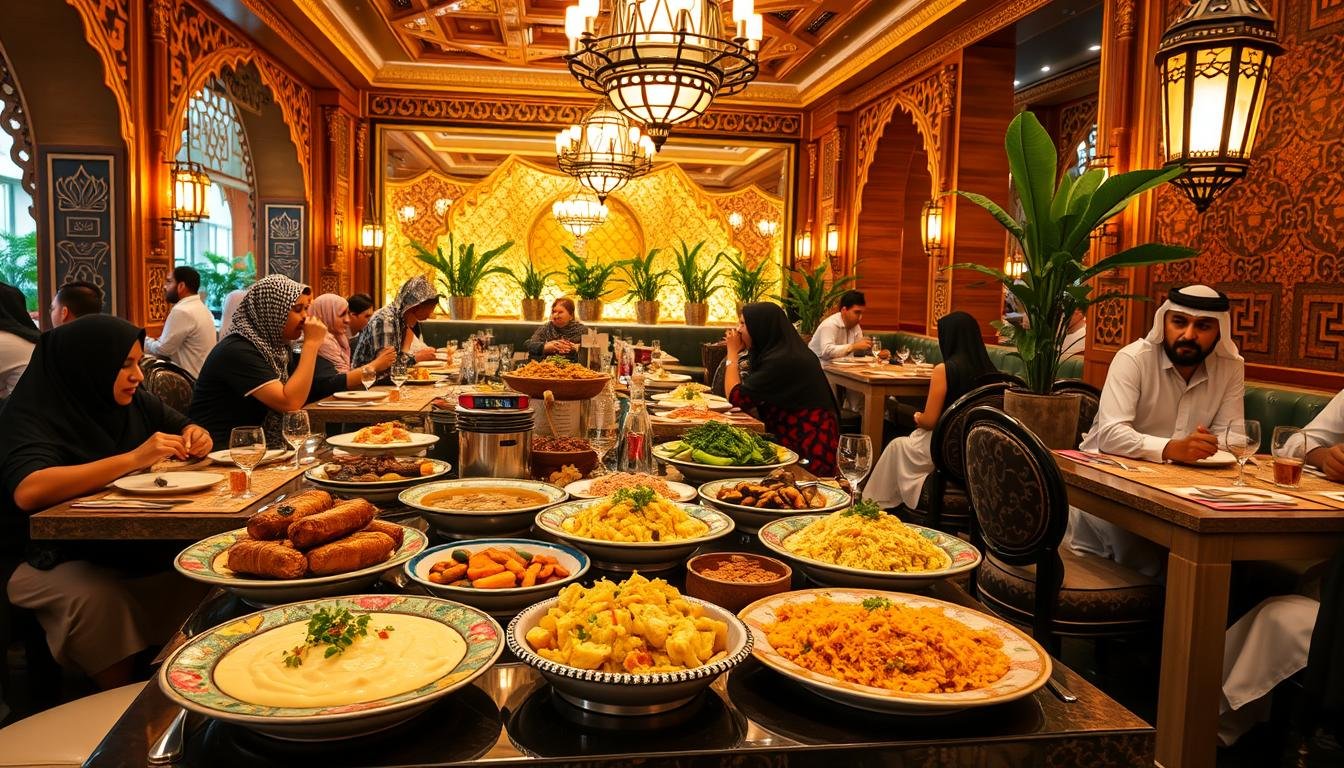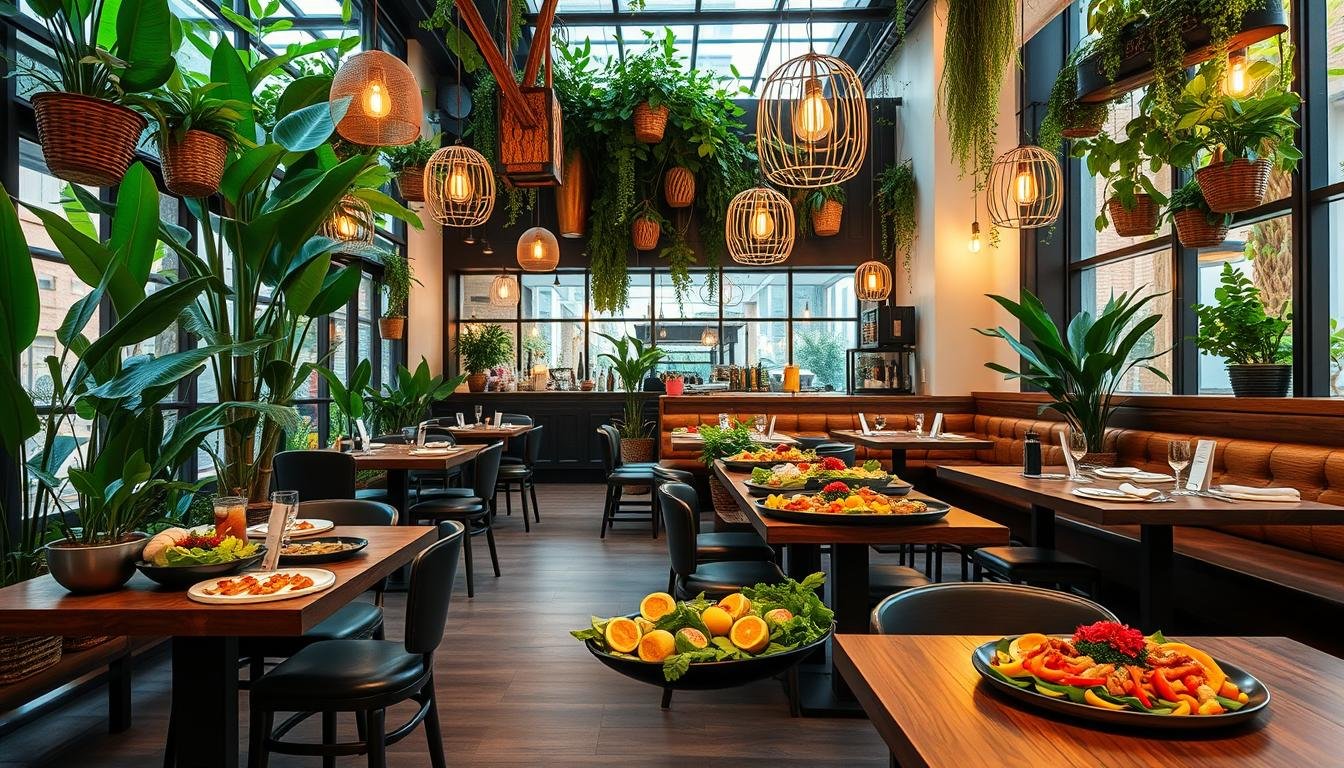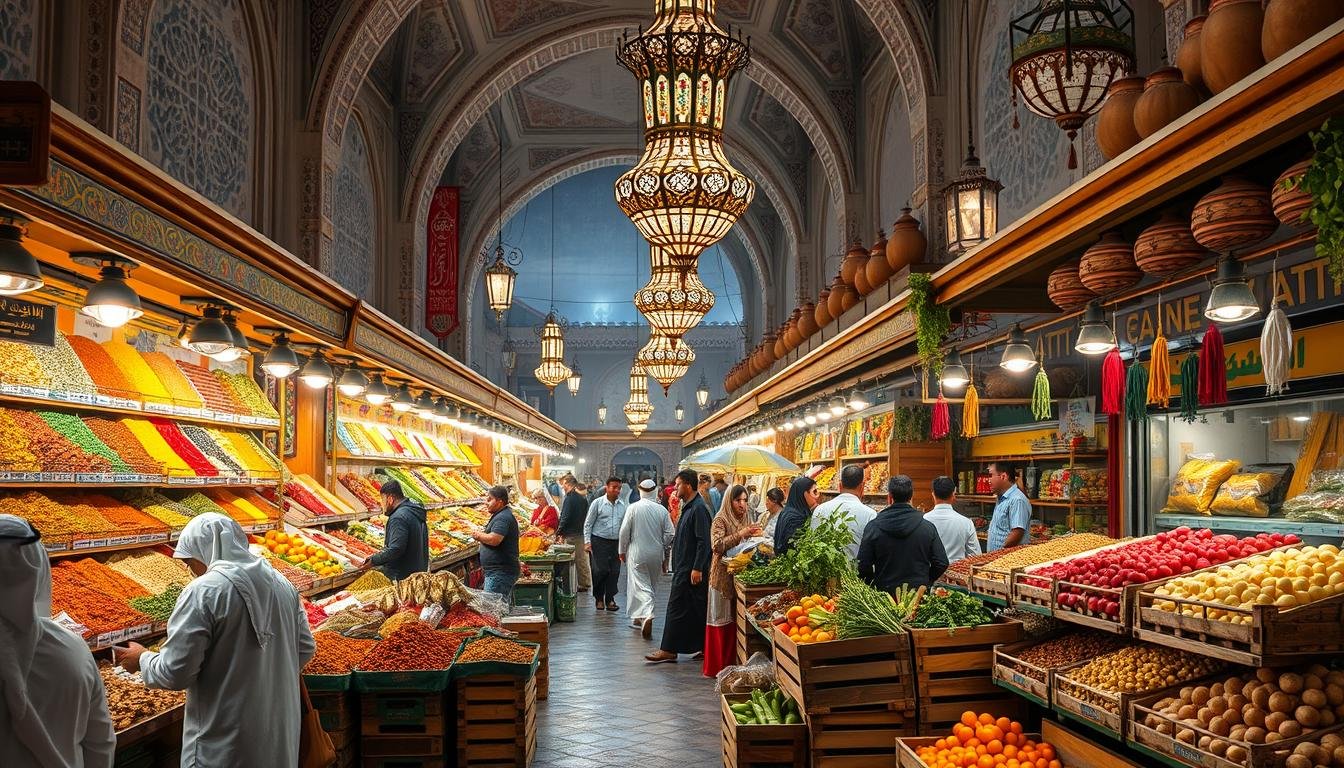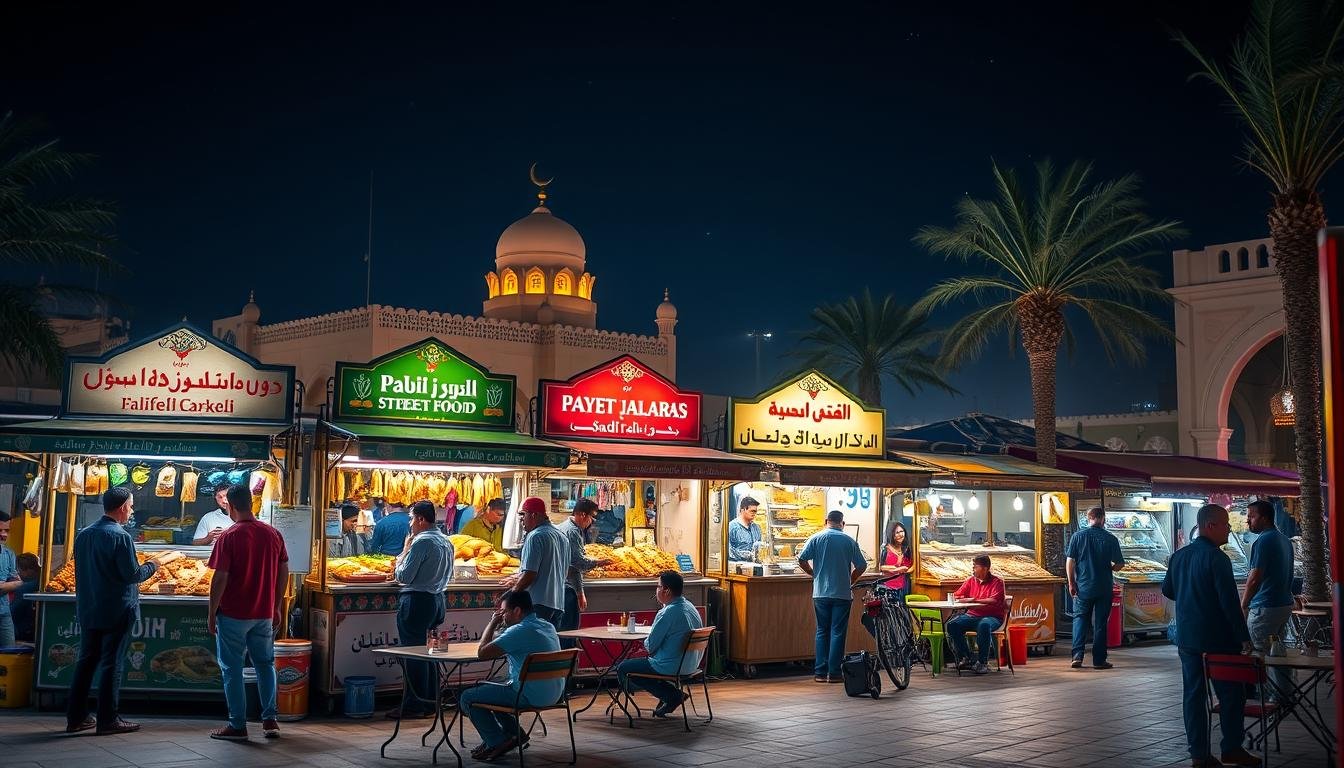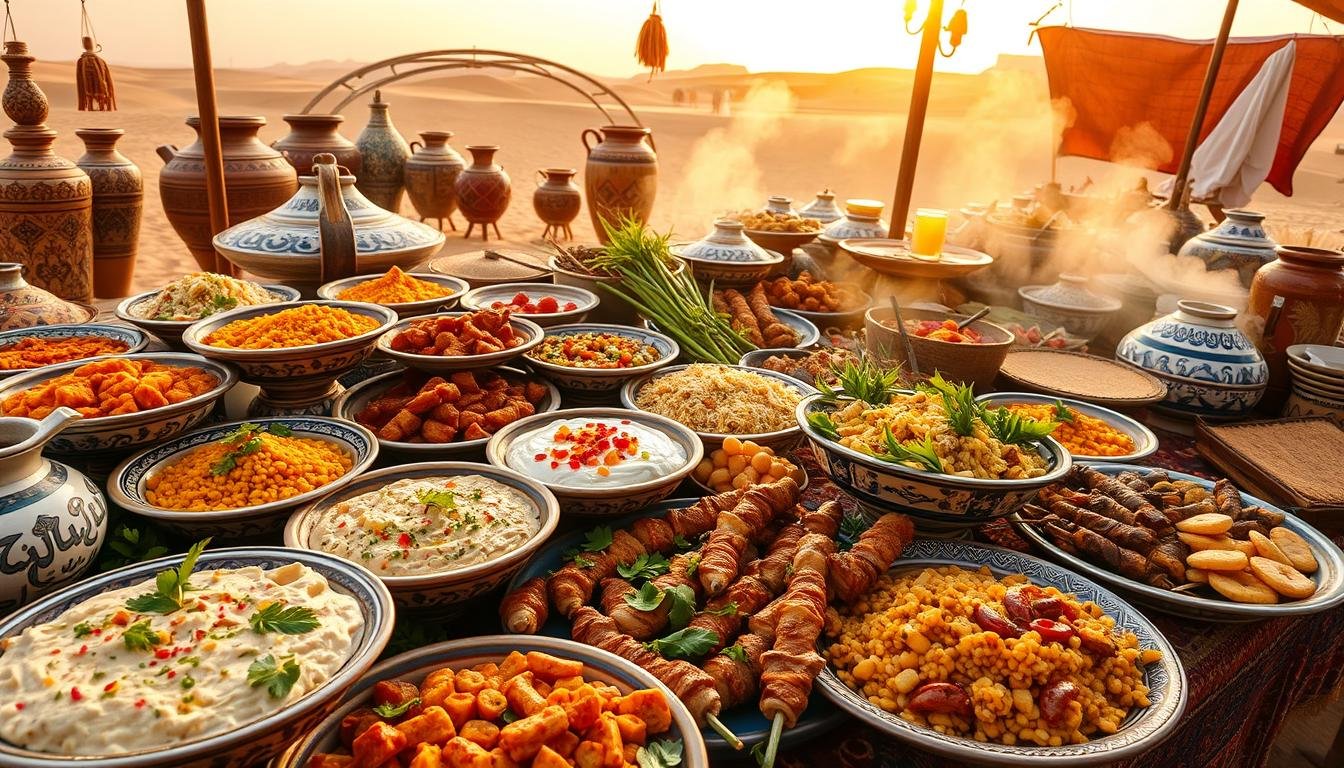Ever wondered about dining in a place where Islamic laws guide food choices? Welcome to Saudi Arabia’s halal dining world. Here, every meal is a blend of culture and faith.
This guide will show you the beauty of halal food and Saudi cuisine. You’ll learn how to enjoy the kingdom’s dining scene. It’s perfect for Muslim travelers or anyone curious about Saudi food.
But first, a question: How does Saudi Arabia’s Islamic laws shape its food culture? What can we learn from their halal dining? Let’s find out as we dive into Saudi Arabia’s halal dining scene.
Understanding Islamic Dietary Laws in Saudi Arabia
Saudi Arabia is a mix of cultures, and its food is deeply influenced by Islamic dietary laws. To enjoy halal dining, knowing the basics is key. This includes how food is prepared and eaten in the kingdom.
Core Principles of Halal Food
Halal food focuses on purity and ethical eating. It must not include pork, alcohol, or animals not killed the right way. Also, all tools and surfaces must be clean to avoid non-halal stuff.
Saudi Arabia’s Halal Certification Process
Saudi Arabia has a strict halal food system. The Saudi Arabian Standards Organization (SASO) checks food very closely. Only food that meets high standards gets the SASO seal, making sure it’s halal.
Common Non-Halal Ingredients to Avoid
- Pork and pork-derived products, such as gelatin and lard
- Alcohol and alcoholic beverages
- Animals that were not slaughtered according to Islamic law
- Ingredients derived from animals that are considered haram (forbidden), such as carnivorous animals, birds of prey, and insects
Knowing about halal food and Saudi’s certification helps diners enjoy meals that fit their beliefs. It makes exploring the country’s food scene easier and more meaningful.
Traditional Saudi Arabian Cuisine: A Halal Food Journey
Dive into the world of Saudi Arabian cuisine, where every dish follows halal food rules. You’ll taste vibrant spices and learn cooking methods passed down for generations. This journey through traditional saudi dishes will show you the heart of local food.
Saudi cuisine respects Islamic dietary laws deeply. This ensures every ingredient and cooking method is halal. This focus on purity has woven a unique culinary landscape, blending regional flavors and traditions.
The Flavors of Saudi Arabia
Walking into a Saudi kitchen, you’ll smell spices like cardamom, cinnamon, and cumin. These spices add unique flavors to many traditional saudi dishes. Lamb, chicken, and rice are common, often mixed with fresh veggies, dried fruits, and herbs.
- Mandi: A beloved rice dish featuring tender, slow-cooked meat infused with a blend of aromatic spices.
- Kabsa: A fragrant rice-based meal that showcases a medley of spices, meat, and vegetables.
- Jareesh: A hearty porridge-like dish made with cracked wheat, meat, and vegetables, offering a comforting and filling meal.
These dishes are key to saudi arabian cuisine. Each one shows the region’s rich culinary history and dedication to local halal food.
Exploring Saudi cuisine, you’ll find a mix of flavors and textures. These reflect the cultural influences that have shaped the region. From coastal cities to the interior, each area has its own special dishes. This makes for a memorable halal food journey.
Popular Halal Restaurants in Major Saudi Cities
Exploring halal dining in Saudi Arabia is a fun food journey. You’ll find everything from fancy restaurants to street food and family spots. Each place shows off the rich flavors of Saudi Arabian food culture.
Fine Dining Establishments
In Saudi’s big cities, you’ll find top-notch halal restaurants. They mix traditional Saudi tastes with new cooking styles. This makes for a memorable meal. Places like Spice Market in Jeddah and Najd Village in Riyadh are must-visits.
Local Street Food Vendors
The streets of Saudi cities are full of halal street food. You can smell the shawarma in Mecca and see the grills in Dammam. These spots serve tasty halal dishes that locals and tourists love.
Family-Friendly Dining Options
For families, Saudi has many halal places to eat. Restaurants in Jeddah and Riyadh have big spaces and areas for kids. Places like Al-Baik and Al-Tazaj make sure everyone has a good time.
| Restaurant | Cuisine | Location | Dining Experience |
|---|---|---|---|
| Spice Market | Seafood, Fusion | Jeddah | Fine Dining |
| Najd Village | Traditional Saudi | Riyadh | Fine Dining |
| Al-Baik | Fried Chicken | Jeddah | Family-Friendly |
| Al-Tazaj | Grilled Meats | Riyadh | Family-Friendly |
Navigating Food Markets and Grocery Shopping
Exploring the vibrant local halal food scene in Saudi Arabia is key to diving into the country’s rich food culture. You’ll find bustling Saudi Arabian cuisine markets and well-stocked grocery stores. Navigating halal food regulations is a fun journey for food lovers and home cooks.
In Saudi Arabia’s food markets, look for halal labels and certifications. These show the products follow Islamic dietary laws. Knowing common halal symbols helps you make smart choices. Many markets have staff ready to help you pick out halal meats, produce, and special ingredients.
- Identify halal-certified products by their distinct labels and certifications
- Engage with knowledgeable market vendors to learn about local halal food offerings
- Explore the vibrant sights, sounds, and aromas of traditional Saudi Arabian cuisine markets
For those who like grocery shopping, Saudi Arabia’s supermarkets and specialty stores have lots of halal food choices. From packaged goods to fresh produce, always read labels and know halal food regulations to make good choices.
| Halal Grocery Essentials | Tips for Successful Shopping |
|---|---|
| Halal meat and poultry Dairy products Grains and legumes Fruits and vegetables Condiments and spices | Check for halal certifications and labels Familiarize yourself with common non-halal ingredients Engage with store staff for product recommendations Plan meals and create a shopping list in advance |
By exploring Saudi Arabia’s food markets and grocery stores, you’ll dive into the country’s rich food traditions. You’ll also discover a wide range of halal food options.
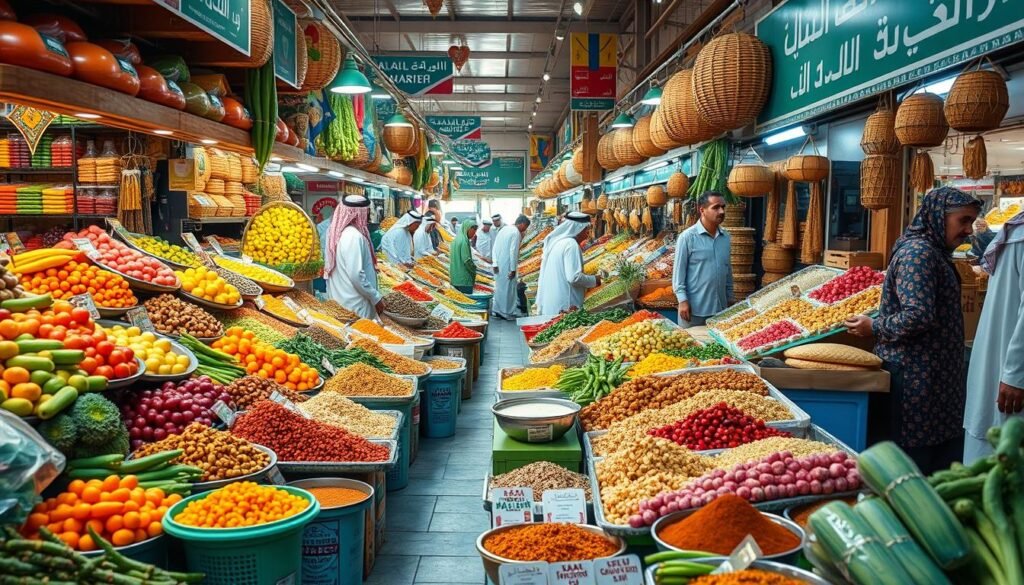
Halal Dining in Saudi Arabia: Everything You Need to Know
Exploring Saudi Arabia’s food scene is exciting. Knowing the dining rules and customs is key for a great experience. This guide will help you enjoy the halal dining in the heart of saudi arabian culinary culture.
Dining Etiquette and Customs
Dining in Saudi Arabia is a cultural experience. It shows the country’s traditions. Remember to use your right hand for eating and avoid public affection. Also, don’t talk about politics or religion.
Prayer Times and Restaurant Hours
Daily life in Saudi Arabia is shaped by prayer times. Restaurants often close during these times. Knowing these schedules helps plan your meals.
Segregated Dining Areas
Many restaurants have separate areas for families and single men. This is a common practice. It’s important to respect these divisions to avoid any issues.
| Dining Etiquette | Prayer Times and Restaurant Hours | Segregated Dining Areas |
|---|---|---|
| Use right hand for eating Avoid public displays of affection Refrain from discussing sensitive topics | Restaurants may close briefly during prayer times Plan dining experiences around prayer schedules | Separate dining areas for families and single men Respect cultural norms and divisions |
Learning about halal dining in saudi arabia helps you enjoy the food scene. You’ll dive into the saudi arabian culinary culture with confidence and respect.
Regional Culinary Differences Across Saudi Arabia
Saudi Arabia’s diverse regions bring unique flavors to the table. From the Hijaz’s aromatic spices to the Najd’s hearty stews, each area has its own traditional Saudi dishes. This makes for a fascinating food journey.
In the Hijaz, you’ll find delicious seafood like mlukhiyah and Jeddawi kabsa. These dishes are known for their rich flavors and spices.
- Mlukhiyah (leafy green stew)
- Jeddawi kabsa (spiced rice dish)
- Samak mashwi (grilled fish)
The Najd region is all about meat. Try the slow-cooked madfun and savory mathbi for a taste of its hearty cuisine.
- Madfun (slow-cooked lamb)
- Mathbi (grilled meat skewers)
- Thareed (meat and vegetable stew)
Head to the Eastern Province for seafood and rice dishes. Machboos and hamour are must-try dishes here.
| Region | Signature Dishes |
|---|---|
| Hijaz | Mlukhiyah, Jeddawi kabsa, Samak mashwi |
| Najd | Madfun, Mathbi, Thareed |
| Eastern Province | Machboos, Hamour |
Exploring Saudi Arabia’s food scene reveals its rich heritage. It shows the diversity and complexity of Saudi Arabian cuisine.
Modern Halal Food Trends in Saudi Arabia
Saudi Arabia’s halal food scene is changing fast. The country is mixing international tastes with halal rules. We see new food delivery services and modern dining spots that meet today’s tastes.
International Cuisine Adaptation
In Saudi Arabia, you can try many international dishes. From Italian pizzas to Japanese sushi, all made halal. Restaurants mix global flavors with local ingredients, creating something special for everyone.
Food Delivery Services
Halal food delivery has changed how people eat in Saudi Arabia. Mobile apps and websites offer a wide range of halal food. It’s easy to find and order your favorite dishes with just a few taps.
Contemporary Dining Concepts
New halal dining spots are popping up everywhere. From rooftop bars to fusion restaurants, they offer top-notch, halal food in stylish places. These places are changing how people see and enjoy halal food.
Saudi Arabia’s food scene is getting more exciting. It’s attracting both locals and visitors with its variety and quality. The country’s halal food is a celebration of its rich culture.
Tips for Non-Muslim Visitors Dining in Saudi Arabia
Exploring halal dining in Saudi Arabia is a great way for non-Muslim visitors to dive into the local culture. By following local customs and understanding Islamic dietary laws, you can enjoy the country’s diverse food scene.
Here are some tips for dining in Saudi Arabia as a non-Muslim traveler:
- Learn about halal food: Get to know what’s allowed and what’s not in halal food. This knowledge helps you choose the right foods at restaurants and markets.
- Follow dining etiquette: In Saudi Arabia, it’s polite to eat with your right hand. Also, some places have separate areas for men and women to eat.
- Keep an eye on prayer times: Restaurants and cafes often close for the five daily prayers. Knowing these times helps you plan your meals without interruptions.
- Try traditional dishes: Saudi Arabian food is rich and delicious. Try mabshoor, kabsa, and mutabbaq to taste the local flavors.
- Be open and respectful: Enjoy the dining experience by being curious and friendly. Talk to locals, ask questions, and learn about their food traditions.
By following these tips, non-Muslim visitors can fully enjoy the halal dining in saudi arabia, halal travel guide, and saudi arabian culinary culture. They’ll make lasting memories and understand the country’s food heritage better.
Special Dietary Considerations and Options
Exploring Saudi Arabia’s food scene is exciting, especially for those with special diets. Whether you’re vegetarian, vegan, or have food allergies, there are many halal options. These cater to your dietary needs.
Vegetarian and Vegan Choices
Vegetarians and vegans will find many halal restaurants in Saudi Arabia. They offer a variety of plant-based dishes. You can enjoy traditional Middle Eastern foods like falafel and hummus, or try new vegetable dishes.
Gluten-Free Options
For those on a gluten-free diet, there are more halal restaurants in Saudi Arabia. Many places have gluten-free versions of classic dishes. They also have special gluten-free menu items, making it easy to eat well while following halal rules.
Food Allergies Management
Dealing with food allergies can be tough, but Saudi Arabia’s halal restaurants are getting better. When you eat out, tell the staff about your dietary needs. They can help you choose a safe meal and avoid harmful ingredients.
By talking about your dietary needs, you can enjoy Saudi Arabia’s halal food scene. You’ll get to taste both traditional and modern dishes. And you’ll do it all while sticking to your diet.
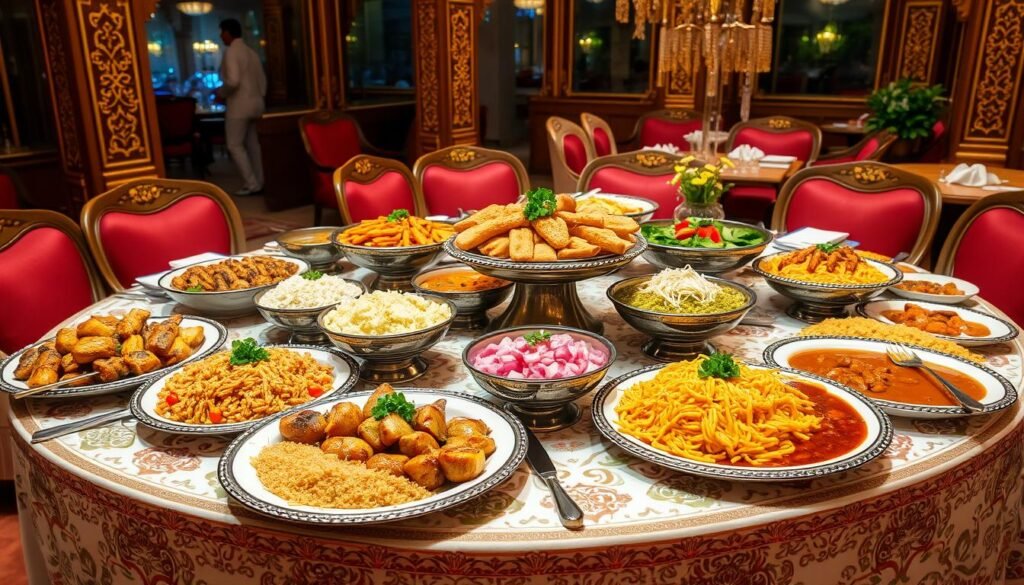
Holiday and Ramadan Dining Guide
Visiting Saudi Arabia, I’m excited to dive into the unique food traditions. The halal dining in saudi arabia scene shines during holidays and Ramadan. Families come together, sharing special recipes.
Eid al-Fitr and Eid al-Adha bring traditional dishes like Machboos and Qursan. These meals highlight the saudi arabian culinary culture, with its rich flavors.
Planning my halal travel guide for Ramadan, I note restaurants might have different hours. They offer special menus for Iftar and Suhoor. This lets me experience Ramadan’s spiritual and communal sides.
FAQ
What are the core principles of halal food in Saudi Arabia?
Halal food in Saudi Arabia follows Islamic dietary laws. It must not include pork, alcohol, or other forbidden substances. Animals are slaughtered according to Islamic rituals to ensure the meat is halal.
How does Saudi Arabia’s halal certification process work?
Saudi Arabia has a strict halal certification process. Authorized bodies inspect food products for compliance with Islamic standards. Only products with the right certification can be sold and eaten in the kingdom.
What are some common non-halal ingredients I should avoid when dining in Saudi Arabia?
Avoid pork, alcohol, gelatin from non-halal sources, and certain animal fats in Saudi Arabia. Always check food labels and ask about ingredients to ensure they follow Islamic dietary laws.
What are some of the most popular traditional Saudi Arabian dishes?
Traditional dishes include Kabsa, Mandi, Mutabaq, and Shawarma. These dishes are halal and showcase the kingdom’s rich culinary heritage.
Where can I find the best halal dining options in major Saudi cities?
Major cities like Riyadh, Jeddah, and Dammam offer many halal dining options. You can find upscale restaurants, family-friendly eateries, and street food stalls serving traditional and international halal dishes.
What should I keep in mind when navigating food markets and grocery shopping for halal products in Saudi Arabia?
Look for halal certification and labeling when shopping. Learn about halal-approved ingredients and avoid non-halal items. Many markets have dedicated halal sections to help you find the right products.
What are some important dining etiquette and customs I should be aware of when eating in Saudi Arabia?
Be mindful of local customs and etiquette. Respect prayer times and gender-segregated dining areas. Use your right hand for eating and don’t leave food on your plate.
Are there any regional culinary differences across different parts of Saudi Arabia?
Yes, Saudi Arabia’s cuisine varies by region. The Hijaz is known for seafood, Najd for meat, and the Eastern Province for Persian and Levantine flavors. Exploring these traditions offers a unique culinary experience.
What are some modern halal food trends emerging in Saudi Arabia?
Modern trends include adapting international cuisines to halal standards and growing food delivery services. Contemporary dining concepts also cater to changing tastes while following Islamic dietary laws.
As a non-Muslim visitor, what tips can you offer for navigating the halal dining scene in Saudi Arabia?
Respect local customs and dietary preferences. Look for restaurants with clear halal certification and ask about ingredients. Familiarize yourself with halal foods and be aware of prayer times and gender-segregated areas.
What special dietary options and considerations are available for vegetarians, vegans, and those with food allergies in Saudi Arabia?
Saudi Arabia offers various dietary options. Vegetarian and vegan dishes are becoming more common. For food allergies, communicate your needs with restaurant staff and ask about allergens in food preparation.
How does dining in Saudi Arabia differ during holidays and the holy month of Ramadan?
Holidays and Ramadan offer unique dining experiences. Special dishes like Eid Mubarak cookies and Luqaimat are served during Eid. Restaurant hours may change during Ramadan, focusing on the iftar meal.
Don’t forget to share your experience in the comments and follow us on social media at the bottom of the site.
